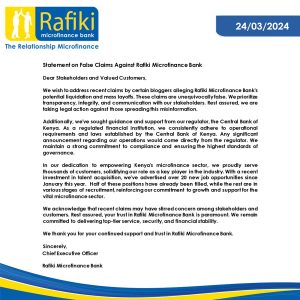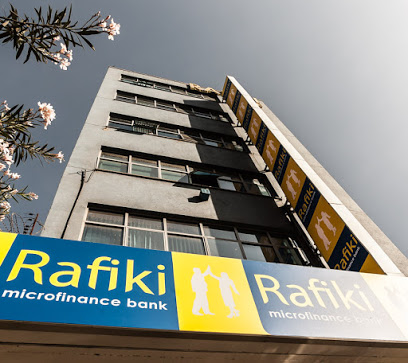Former micro-lender to the collapsed Chase Bank, the Rafiki Microfinance Bank has ruled out claims of alleged liquidity crisis or winding its operations and effecting mass layoffs amidst online allegations of financial instability.
In a statement posted on their official social media platforms on March 28, 2024, Rafiki Microfinance Bank Chief Executive Officer (CEO) Joseph Ngugi Njuguna said the ex-Chase bank owned micro lender is in constant touch with the banking regulator – the Central Bank of Kenya (CBK) and ruled out reports of potential liquidation.
Through a public notice titled “statement on false claims against Rafiki Microfinance Bank”, Njuguna sought to reassure their clients on the financial soundness of the financial institution which had been put into question.
“We acknowledge that the recent claims may have stirred concern among stakeholders and customers.” The statement reads in part.
“As a regulated financial institution, we consistently adhere to operational requirements and laws established by CBK…Any significant announcement regarding our operations would come directly from the regulator.” The statement further says.

However, when contacted by The Informer Media Group for comment via short text message and through mail on whether the bank’s cash-flow issues had been flagged by either CBK or KDIC and the progress on shopping for a strategic investor to inject capital to turn around the financial institution, Njuguna did not respond.
Our sources intimated that Rafiki is seeking for a local or foreign strategic investor.
Also, Njuguna did not comment on why Rafiki Microfinance Bank not included in the SBM’s acquisition of Chase Bank in 2018.
Rafiki is under the supervision of the Kenya Deposit Insurance Corporation (KDIC).
It has been actively seeking a strategic investor to turn it around.
Rafiki, a subsidiary of Chase Bank, commenced its operations in the Kenyan market in 2011, with a focus on the microfinance sector.
On April 7, 2016, Chase Bank was placed under receivership due to a surge in deposit withdrawals following the circulation of reports regarding liquidity issues on the Internet.
This news triggered a rush of customers to the bank, resulting in long queues as individuals sought to withdraw their savings from its branches.
Chase Bank was reopened on April 27, 2016, under the supervision of the KDIC.
In 2018, SBM Bank, a financial institution from Mauritius, acquired 75 per cent of specific assets and liabilities from Chase Bank, a transaction that was perceived as selectively acquiring ‘good assets.’ Rafiki, a subsidiary of Chase Bank, was not included in SBM’s acquisition.
Rafiki, which happens to be the third largest microfinance institution in Kenya, operates 19 branches across 11 counties in the country.
The CBK’s 2023 Supervision Report painted a gloomy picture of microfinance banks which are managed by CBK including Rafiki as they struggle with huge losses against dwindling returns.
Out of a combined loss before tax of Sh980 million incurred by six microfinance banks, CBK indicated that two micro-financiers Maisha and Rafiki reported pre-tax losses of Sh477 million and Sh314 million respectively.























